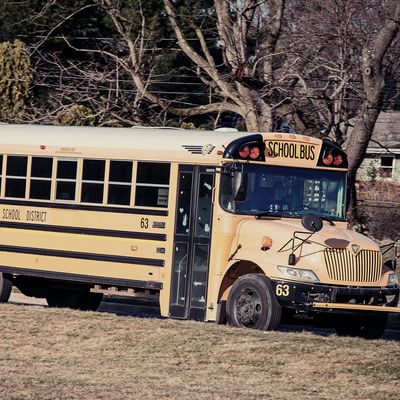
Mark Murphy, 41
Former Delaware education secretary
Dover, Delaware

I was the education secretary in Delaware for a little over three years. I came into that role in 2012 under Governor Jack Markell. Before that, I had been a schoolteacher and a principal.
One of the big critiques of the American education system is that it is incredibly disjointed because there’s no central authority. You’ve got the federal government saying, “We’ll only give you money if you do X, Y, and Z.” At the state level, you have education secretaries exercising power in widely varying ways. Each state is different.
In Delaware, I was responsible for what kids were actually going to learn. I was responsible for all the certification — what you expect a teacher to be able to know and do, what you expect a principal to know and do. All the regulations around that. Thousands of pages of regulations. Everything from school lunch to early-childhood education to college scholarships to health codes to kids who don’t speak English — you name it, there are regulations around it, and the Department of Education and the secretary are responsible for all of them.
I’d get, I don’t even know how many, requests a day to meet. There’s this constant stream of people wanting to meet with you. You’ve got parent groups and special-education advocates and school-board advocates and all these different people knocking on your door. And trust me, they’re not knocking on your door because they’re happy. Or someone will say, “The senator who runs the education committee needs to meet with you at 2 p.m. because there’s an education committee at 3 p.m. and he wants to put a bill on the agenda.” You don’t say no to that meeting.
It’s an incredibly diverse job, and I think it’s easy to get lost in the minutiae. But I think the core of it, and what is super-important, is saying, “Listen, I am here for kids. I’m not here for the teachers’ union, I’m not here for that individual politician representing their suburban district, and when I go home at night and lay down, I have to know that, whatever I’m doing, it’s going to help kids.” But everybody has a real reason to listen to the teachers’ union, because if you don’t, then you get voted out of office.
Frankly, kids’ interests and adults’ interests don’t always align. Kids have no power, no say, no decision-making authority, no money — so nobody has a real reason to listen to kids. Go shadow a high-school kid for a day — good luck staying awake. You have to walk from class to class, with four minutes between each bell. You have to raise your hand to go to the bathroom. It is so disempowering and so boring.
Just about every week I was in schools visiting classrooms, talking to principals, talking to teachers, talking to students. When you show up in a school as the secretary of education, you want them to know that you’re also a human being — you have kids, too. When I’d walk into a kindergarten classroom, I’d just go and sit down with the kids on the carpet. If they’re working on their tiny, little chairs at their tiny, little table, go over and get a tiny chair and sit at the table with them. You buy some suits that are relatively comfortable and sit on the floor of the classroom. You do what the kids do.
Negotiating with the unions was a huge part of my job and they didn’t always love me. Here was the problem: I would spend hours with the top leadership of the union. There was a union president who was elected, and there was an executive director who was the person who ran the office. I spent the most amount of time with them. But that leadership had to report to a board of local union leaders. What would happen is, I would feel like I had reached an agreement with the union leadership, but then they came back a month or two later and that wasn’t how their membership felt. I should have spent more time meeting with local leadership. In hindsight, I would have done that differently.
Imagine if the teachers’ union was a gatekeeper for quality teaching: “We, the union, care deeply about high-quality teachers and we are going to do everything we can to ensure we have high-quality teachers,” instead of, “We’re going to spend our time defending teachers who do bad things, and negotiating for better health benefits and salary.” I’m not saying those things are unimportant; I actually tried to pay teachers more money, but I wanted to link the money to their responsibilities and their performance. But the teachers’ union doesn’t even want to talk about how one teacher is a lot better than another.
The hours were ridiculous. I was working by 6 in the morning, and most nights until 10 or 11. I would work a full day on Sunday because Sunday is the one day where you can actually get caught up. Maybe one out of every two Saturdays, there’s some event you have to go to. The evenings are filled with meetings and events. There are a lot of secretaries who are figureheads, but that wasn’t me. I can quote the regulations; I know the policy in and out. I knew the minutiae of the controversies around teacher evaluations and accountability. And the only way you can be a hands-on person is if you spend Sunday working and start reading at 6 a.m. and engaging with your team. My total staff was around 200 people, and my senior team was around 10 people. They worked just as hard, if not harder.
You have to ask yourself in these jobs if you’re making fundamental changes to the education system, or if you’re constantly making superficial changes. I think we made somewhere in-between. I tried to change the funding system. I couldn’t get that done. I tried to change how teachers were paid. Couldn’t get that done. Tried to change how we dealt with the lowest-performing schools. Couldn’t get that done. Each time you try to turn around a school, or you open or close a charter school, or disagree with the union, you punch another hole in the bucket and you start to drain out. You lose some political capital. Eventually, you’re out of water.
One of the biggest clashes came over the schools in the city of Wilmington, where many of the schools have been really bad for a really long time. I tried to move an initiative that would have put much more power in the hands of the school principal. That wasn’t received very well from a district perspective. It was like, “Wait a minute, the state is coming in here telling me how to run my school. The state is taking authority away from the school-district leaders and the school board, and putting it right in the hands of the people in the school. That’s kind of scary.” I also said everybody should have to reapply for their jobs. If you’re a teacher in one of these schools, the new principal who comes into the school should decide whether you stay or whether you don’t stay. The teachers’ union was quite upset about that.
There was a group of stakeholders: teachers, parents, business leaders, public officials. The group was charged with figuring out what should be the plan for how we moved forward with Wilmington. The subtext was: This other plan we’ve got right now, nobody likes it, so let’s form this committee. That committee proceeded to meet for six months. They wrote a report and they got a lot of energy. I did not agree with it. At the end of the legislative session, there was a huge vote on whether they were going to move forward with the committee recommendations. The legislature voted it down. These people put in hundreds of hours of work, and then the legislature says, “No, thank you.” Here’s the worst part: After they voted it down, the legislature said, “We want you to keep working on this — it’s just not ready yet.” So the legislature gave them $100,000 or something to keep meeting and talking. Literally, it’s two years later, and they’re still talking.
I walked into this job believing that our education system in the United States needed massive improvement, and that the only way it was going to improve was if some fundamental things changed about how education worked in this country — how the money flows, who controls the money, how teachers are compensated and held accountable, and how districts and principals are held accountable and rewarded. All these dynamics of power and privilege need to be addressed, which threatens the status quo. People who are in positions of authority, they’ve got into the positions of authority through the status quo. The system worked for them. The system is not working for the kid in Wilmington who winds up dropping out of high school because he had a bad educational experience. If every kid had access to a middle-class lifestyle, the country would be a much better place, and people wouldn’t be so angry about all the immigrants. And education can do that!
I am really nervous that really great people are going to stop being willing to pursue public office because you get publicly and professionally assassinated in these jobs. The people who, day in and day out, are running our government — these are not bad people. They show up to these jobs because they care, and they take pay cuts to do it, and nobody thanks them. Very rarely do you get thanks.